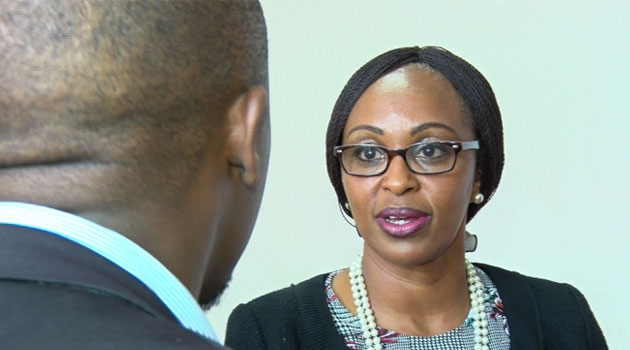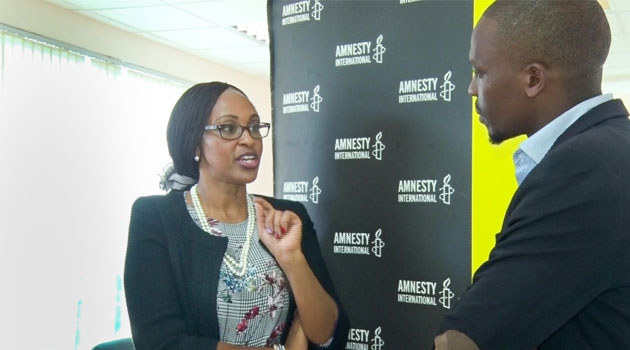
According to Ngamau and a fact proved by research, the killing of suspects will not address the root cause of the menace/SAM WANJOHI
NAIROBI, Kenya, Nov 21 – What if we all remain silent? Will this mean the guns will go silent too?
It is more of a challenge to Kenyans than a question that was posed by Amnesty International-Kenya Board Chairperson Renee Ngamau, in an interview with Capital FM News.
The lawyer, former morning radio show host and now a human rights defender firmly believes that everyone should become an activist on this front.
She assumes office a time when the country is facing a myriad of security challenges; on one side are police officers determined to ‘fight’ crime while on the other is an expectant populace.
Expectant in the sense that they want the rule of law to prevail. But a section of the populace, more so in slum areas, are silently mourning.
In the last week of October, 18 people were killed by police in separate incidents, a majority in Nairobi’s Dandora, Mathare and Huruma areas.
The cases were documented and are being probed by the Independent Policing Oversight Authority.
But there is a third hidden hand, and one that seems to be more aggressive; that of human rights defenders who insist police must not kill suspects of crime while enforcing the law.
In the past three weeks, 23 people suspected of committing crime have been shot dead, Ngamau said.
Over the weeks, tens others have gone silent the same way – the bullet way.
According to Ngamau and a fact proved by research, the killing of suspects will not address the root cause of the menace.
“Has crime stopped despite the killings?” she rhetorically asked.
“If we do not do something different, we will remain here, for very many dark nights.”
She added: “If we are committed to young men hoping to see their 40th birthday and hoping to raise their children in dignity and not either being a victim of robbery, police execution or enforced disappearance, we have to rethink our strategy.”

According to Ngamau and a fact proved by research, the killing of suspects will not address the root cause of the menace/SAM WANJOHI
With unemployment levels being at an all-time high, Ngamau says the government should invest more in job creation for the majority of the youthful population, some of whom have resorted to criminal activities.
“What if we say to ourselves that we do not have to insist that everyone has a right to be judged in a court of law?” a visibly emotional Ngamau asked, yet in a firm manner.
“That is the “what if” that really scares me. That is why we’ve got to speak, for those whom we would prefer not to.”
Ngamau urged Kenyans to insist on the rule of law instead of ‘celebrating’ the killings of suspects of crime.
Lately, a section of Kenyans on social media have been cheering on every time a suspect of crime is “fatally injured” – the cop’s language of killing – but Ngamau cautions that the trend has a drastic impact on the society.
As she transits from radio to the ‘human rights world’, Ngamau hopes to remain vocal and a voice of reason in her new mandate.
“What drives me is both pain and dream,” she said.
She is aware of the dangers facing human rights defenders but silence, Ngamau insisted, cannot be an option.
– What’s the current situation? –
According to IMLU statistics, 822 people died from police bullets between 2013 and June 2018.
Of these, 58 alone happened between January and June this year.
Some of the challenges hampering the quest for justice, according to right groups include lack of cooperation and full investigations, lack of independent post-mortem reports that are used in court to establish the cause of death in extra-judicial killings and threats and intimidation by the perpetrators to the victims.
Others include lack of strengthened witness protection mechanism, delay in compensation awards and normalization of extra-judicial killings by Kenyans.
Under Section 25(1) of IPOA Act, the authority is mandated to investigate any death or serious injury including death or serious injury while in Police custody, which are the result of Police action or were caused by members of the Service while on duty.
Upon an incident, police are required by Section 25(2) of the Act to, “take all necessary steps to secure evidence which may be relevant for the investigation, including pictorial and written evidence, and shall in writing notify the Authority, and supply it with the evidence and all other facts relevant to the matter, including, if available, the names and contact details of all persons who may be able to assist the Authority should it decide to conduct an investigation.”
The National Police Service is currently implementing drastic reforms with a hope of addressing its troubled past and transforming to a people-centred service.
Recently the police Internal Affairs Unit was moved from Jogoo House to KCB Towers in Upper Hill and a system launched where Kenyans can anonymously report any case launched.

Ngamau urged Kenyans to insist on the rule of law instead of ‘celebrating’ the killings of suspects of crime/SAM WANJOHI









































